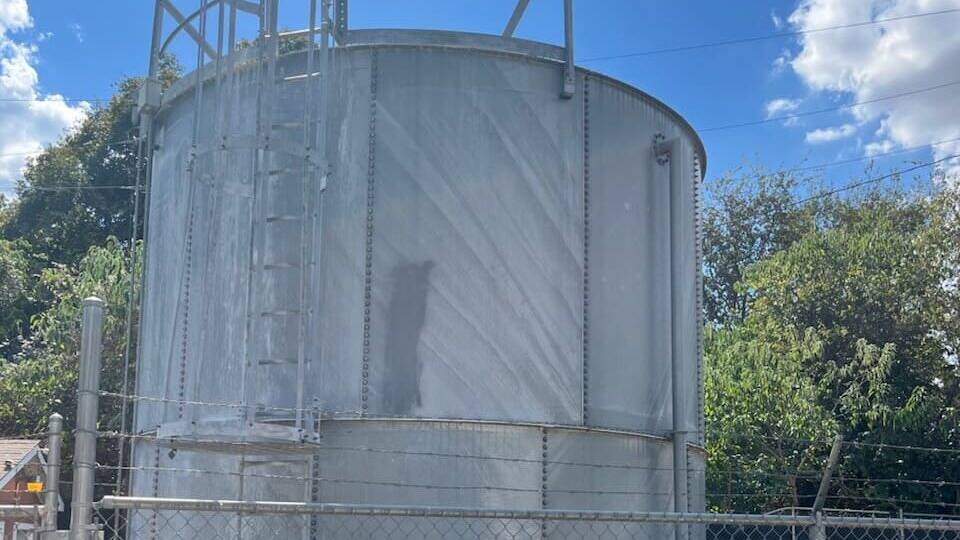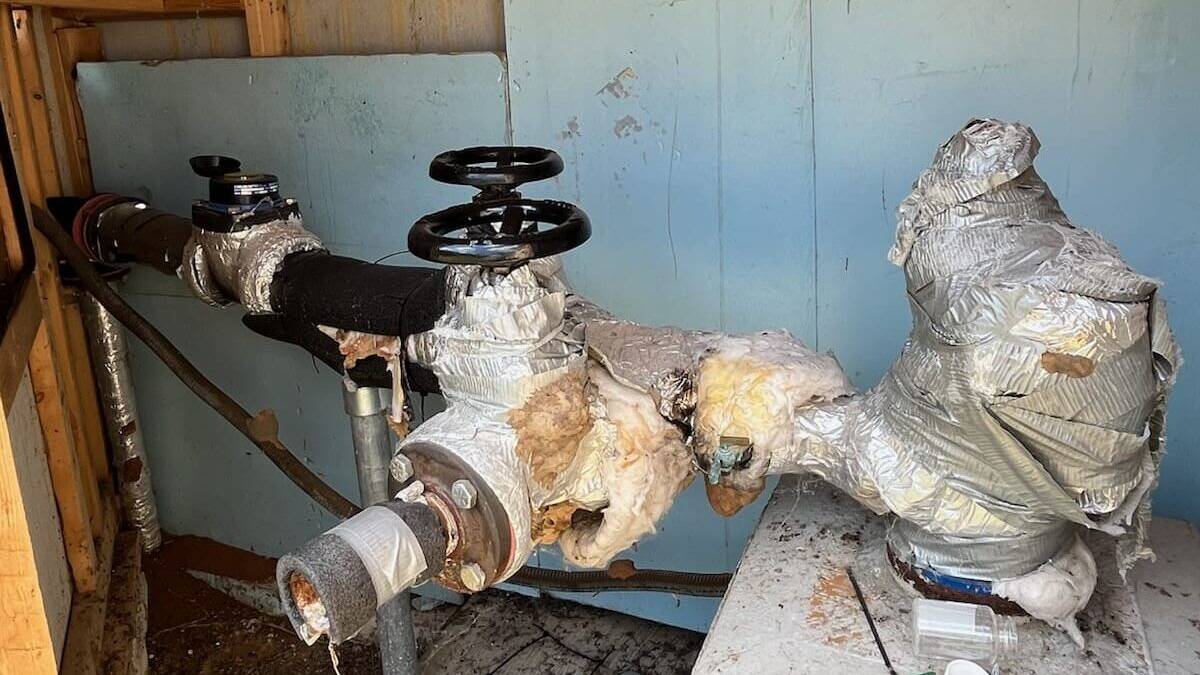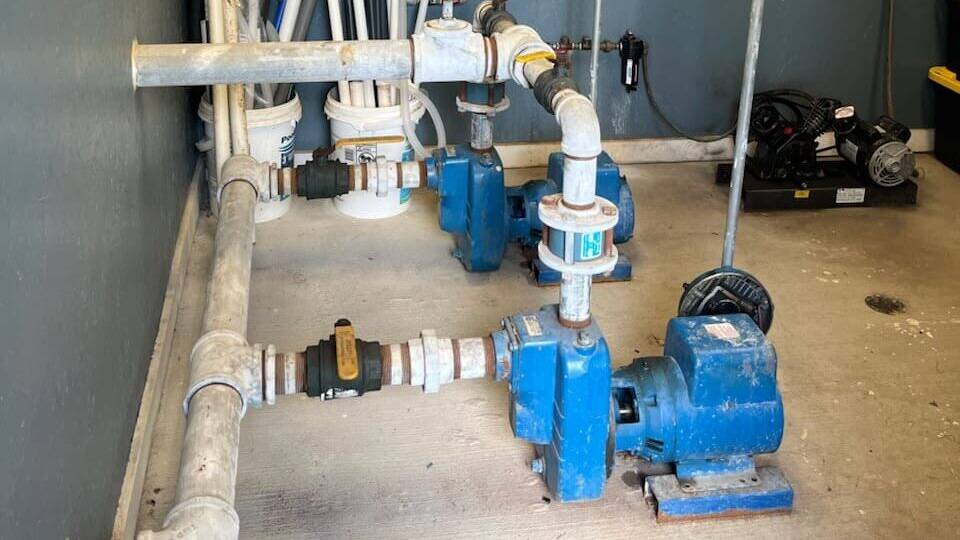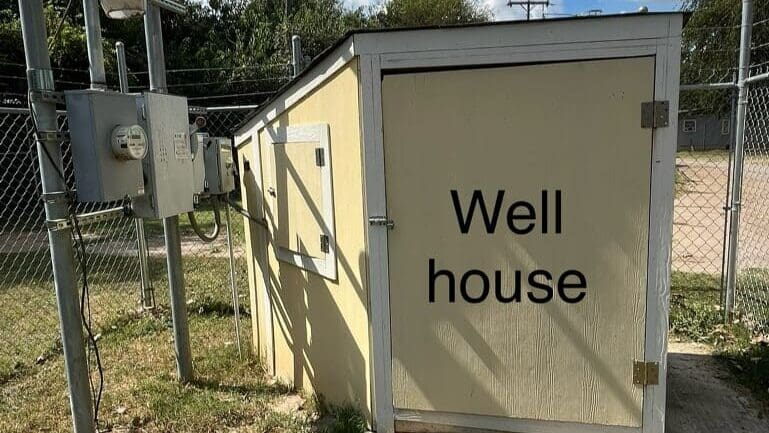On the southern side of Dallas, Texas, just off Dowdy Ferry Road, sits D Bar B Water & Wastewater Supply Corporation — a small, member-owned utility that has weathered decades of change with determination and community grit. Serving 89 homes in a mobile home park, the system has long been the backbone of daily life for its residents, many of whom depend on it for safe, reliable water and wastewater service.
But keeping a system like D Bar B running is no small task. Failing infrastructure, expensive repairs, and limited resources make each year a balancing act. For more than two decades, D Bar B has relied on the support of the Community Infrastructure and Lending Teams at Communities Unlimited (CU) to stay afloat.
Some of D Bar B Water & Wastewater Supply Corporation’s aging infrastructure, which has begun to fail over the years. With support from CU’s Community Infrastructure and Lending Teams, the system has secured grant and loan funding to make critical upgrades and repairs — helping ensure its sustainability for the long haul
A History of Help
D Bar B was first incorporated in 2005 with help from CU’s predecessor, Community Resource Group (CRG). The move transformed the mobile home park’s utilities from privately owned to a nonprofit cooperative, opening doors to funding opportunities and bringing the system into compliance with Texas Commission on Environmental Quality (TCEQ) requirements. CRG assisted with creation, initial rates, budgeting, transfer of the utility ownership, Request for Qualifications (RFQ) for an engineer, and meeting TCEQ compliance.
Since then, CU has stood by the small utility through multiple chapters. In 2015, CU provided a $167,000 loan to help D Bar B pay for an audit and refinance high-interest debt. The loan was fully paid off this spring.
In 2021, the system turned to CU again for an $80,000 loan to purchase and install emergency generators for the sewer plant.
“Without CU’s help, I might’ve made it, but it would’ve been much harder. You all helped me figure things out, call the right people, and find solutions.”
— Doris Vallian, D Bar B Water & Wastewater Supply Corporation
A New Chapter of Repairs and Renewal
On the ground, CU’s Community Infrastructure Regionalization Project Manager Janelle Saucedo has been instrumental in guiding D Bar B through its most recent phases of improvement. Her work bridges the technical and financial sides of infrastructure — helping small systems like D Bar B not only apply for funding but also navigate the complex state procedures that come after awards are granted.
“I’ve been working with Ms. Doris since the fall of 2023,” Saucedo said. “Ms. Doris has been a long-time client since even the CRG days, so I wanted to make sure she got the help she needed.”
That early collaboration paid off. The pair worked closely for months — often over the phone or through in-person visits — to gather the required documentation and complete the technical components of the application.
“Ms. Doris doesn’t use computers often,” Saucedo added. “So, anything I can do to make her life easier, I’ll do it.”
Their persistence led to success. In May 2025, D Bar B was awarded $92,820 through the Texas Water Development Board’s (TWDB) Drinking Water State Revolving Fund (DWSRF) to install an emergency generator at the water well. The funding was the culmination of more than a year of work, beginning in January 2024, and reflects CU’s commitment to helping small systems achieve lasting resilience.
Before installation can begin, Saucedo and Vallian must follow TWDB’s procedural steps — engineering reviews, surveys, and environmental approvals — to ensure full compliance.
“Now, we just need to follow the TWDB procedures before the generator can be installed,” Saucedo said.
At the same time, Saucedo worked hand in hand with CU’s Lending Team and Senior Economic Development Loan Officer Chris Ranniger to prepare and submit a loan application to address urgent repair needs across both the water and wastewater systems. The loans were approved and closed quickly.
The loan funding of $93,770 supports improvements that include lift station rehabilitation, new grinder pumps and control panels, repairs to the main water storage tank, and replacement of a 16-year-old booster pump and motor.
“CU’s process was quick and easy again,” Vallian said. “Everything went smoothly.”
For Saucedo, supporting small systems like D Bar B is a core part of CU’s mission.
“It’s important to continuously support small systems like D Bar B WWSC for whatever needs they may have,” she said. “They’re often run by one person doing it all, and that person — like Ms. Doris — really keeps their community going.”
Resilience Through Partnership
For Vallian, the work is personal. She first got involved as a resident when the park’s water and sewer systems were failing, and state agencies were threatening to shut them down. Instead of walking away, she stepped up.
“I was told not to get involved, that it’d be like a tornado that would run me over,” she said. “But I couldn’t just sit back. People lived here — including me.”
Owning property in the community meant Vallian’s livelihood was directly tied to the system’s success. When she purchased the property, she also inherited the previous owner’s responsibilities and liabilities. The system had been neglected for years, leaving her with no choice but to take charge.
Though she describes it as “like putting a leash around my neck,” Vallian knew that ensuring the system’s improvement and compliance was the only way to protect both her investment and the people who called the park home.
Over the years, her leadership — combined with Saucedo’s behind-the-scenes technical support and CU’s financial guidance — has brought D Bar B from the brink of closure to full compliance. The system has no current enforcement actions and even built a $25,000 reserve fund for emergencies.
Looking Ahead
For CU, the collaboration reflects what sustained support can accomplish. Together, they’ve helped the system secure critical funding, complete complex applications, and navigate challenges that once seemed insurmountable.
D Bar B stands as an example that even the smallest systems can survive and thrive.
“CU should be proud. You’ve helped us become self-sufficient. When everything was broken — no money, no organization, no compliance — you helped me get it back together. I want to thank CU for being there for us. You’ve helped me maneuver through all the challenges, and I’ll tell anyone who’ll listen that CU is important for small systems like ours.”
— Doris Vallian





